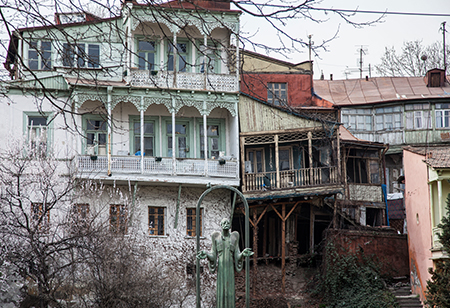Tbilisi takes giant steps to tackle noise pollution

Georgia’s capital city is growing immensely, bringing more and more people into the area. With this rapid urbanization, Tbilisi is becoming seriously noisy, says the Local Government.
Tbilisi City Hall released a new Environmental Strategy earlier this month that outlined the causes of noise pollution in the city. Vehicles, factories and even construction sites were found to create high levels of noise but with standards not currently in place to measure and monitor noise pollution, there is little that can be done.
But this is about to change with the Environmental Strategy 2015-2020.
The Strategy noted noise pollution not only affected the environment but it also caused physical and psychological problems on citizens.
Noise pollution in Tbilisi has become an alarming health hazard.
In Georgia the latest data about noise pollution was released in 2005. That time the highest indicator of noisy areas was recorded in Varaziskhevi area. Other districts found to be excessively noisy were Vajha-Pshavela Ave, Melikishvili St, Rustaveli Ave, Tsereteli Ave and Kostava St.
By definition, noise pollution is when there is either excessive amount of noise or an unpleasant sound that causes temporary disruption to the natural balance. Loud music, the television, people talking on their phone, traffic and even pets barking in the middle of the night are all sources of noise pollution, claimed several official sources.
According to the new five-year Environmental Strategy, cars made the most noise in Tbilisi. One car driving along a road may not make a significant amount of noise but a multitude of cars can become very noisy. This was cited as the main reason of noise pollution in Tbilisi.
There are about one million cars in Georgia of which 40 percent are in Tbilisi. Latest figures showed about 382,285 vehicles were registered in the capital city; the majority are old and do not meet environment standards. Specifically, data showed 57 percent of all vehicles in Tbilisi were more than 20 years old. Only three percent of cars were five years old or less.
Another leading cause of noise pollution in Tbilisi was enterprises, read the Strategy.
Large enterprises should meet noise standards however this was impossible to police as there are no current noise limits or measures in place to record and monitor noise pollution. Until this is changed little can be done.
The Environmental Strategy outlined noise control was not taken into account when projecting new buildings and construction sites as it hasn’t been deemed necessary to control excessive noise levels until now.
The new Environmental Strategy was created by Tbilisi City Hall as a way to address the issues of the capital city. One part of the document envisaged solving existing problems so that noise should not disrupt the lives of Tbilisi residents.
The main goal of the Strategy was to create a healthy environment for locals and develop European standard environment measures in the city.
In this regard, the Strategy outlined several actions that intended to reduce the impact of noise in Tbilisi.
Initially, the Strategy stressed comprehensive research must take place to fully realize the level of noise pollution in Tbilisi. After this a plan needed to be created to reduce noise in the capital city.
Mapping Tbilisi’s noisiest neighborhoods was the third step in tackling noise pollution.
Only after all these had taken place, Tbilisi City Hall will set noise control limits and all new buildings will have better insulation to reduce noise. Tbilisi City Hall also said it would protect older buildings from noise pollution but did not elaborate further on this.
Furthermore, noise limits will be established for construction sites as well.
Addressing Tbilisi’s traffic issues was also outlined in the Strategy. The document included plans on how to reduce the transport flow in the central districts of Tbilisi, which in turn will reduce noise pollution caused by vehicles.
 Tweet
Tweet  Share
Share